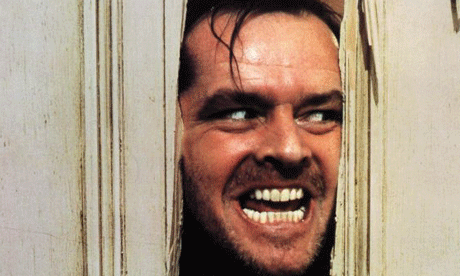 |
| Scary; in a completely different way than the books we've been reviewing this month. |
Enough about Frankenstorm, let's talk about scary books. You may have noticed that I'm an official fan of Stephen King. I think he's a master at building a mood and scaring you with the mundane to then later terrify you with the other-worldly. I've been known to read some of Mr. King's stories with only one eye open (those of us not capable of reading braille really can't read with both of our eyes closed) while curling up into a tight ball and squealing. I'm not too proud to admit that. Of course, I haven't yet thrown my book in the freezer either. And if you don't know what I'm referencing, watch the clip below. (Lobster, I know you need no explanation.) In honor of All Hallow's Eve, I present to you my all-time scariest Stephen King book. All of his stories are scary in some way; like pee-a-little-in-your-pants scary and even I-didn't-realize-I-was-clenching-every-muscle-in-my-body-and-my-fingernails-may-never-come-out-of-my-palms scary. Some of them will haunt you and some of them will ruin your dreams for a couple of nights. That's what makes them fabulous. The Shining was Stephen King's third novel and first hardback bestseller. It was adapted into a movie and later a mini-series. I have read it twice, seen the movie four times, and watched the mini-series. I know this story. There are no more surprises in it for me. Yet it still makes me want to turn on all the lights and make the dog stay indefinitely at my side.
 |
| Yep. He looks crazy. |
When the family arrives, Danny realizes that the hotel itself, The Overlook, has a spirit of its own and it's not a good kind of spirit. The chef there sees that Danny has a rare ability that he shares, and he takes Danny aside and explains to him that the hotel can only show him "pictures" that aren't dangerous. Halloran, the chef, is leaving for his winter gig in Florida but Danny will be able to communicate with him through "the shining" that they share. Things quickly go sideways for the family. Danny realizes that the hotel is trying to use him as a way to feed its need for death and destruction. Danny is strong enough to ward off the increasingly aggressive and spooky power plays (party hats how up in elevators, animal topiary chase him through the hedgerow maze, some kids who haven't actually been alive for years show up in the hallway...you know, all in a day of haunting and possession), so The Overlook changes its focus.
 |
| Even the original cover is creepy! |
Turns out that another caretaker had the same sort of issue one winter. That caretaker murdered his family and then took his own life, so that caretaker never really went anywhere. And now that other caretaker is happy to pour drinks for Jack Torrance and let him in on all the things he should be doing to take care of his familial problems. First, Jack should disable communications (goodbye radio). Then take out the only way down the mountain (snowcat gets dismantled). Make sure the boiler gets dumped (we would hate for the hotel to blow up since it's being so nice and all). Then explain his frustrations to his wife and kid. With a mallet. Or a knife. Whatever gets them to listen. Jack is all too eager to put this particular plan in motion.
When Danny realizes that his dad really isn't his dad anymore, he sends out a distress signal to Halloran. Then he goes about doing his best to keep his mom and himself out of Jack's way as jack slips further and further into madness. Then finally Jack snaps. Halloran shows up only to be grievously wounded by Jack. He goes after Wendy. She manages to lock him in the walk-in pantry and run away. Unfortunately, The Overlook doesn't give up easily and Jack is freed from the pantry by none other than the ghost of Delbert Grady, friendly bartender and murderous caretaker. Jack manages to wound and Wendy and goes after Danny who appeals to any part of his father that may still be present. Jack then wounds himself in an effort to give Danny time to get away from him. Danny reminds Jack that the boiler needs to be dumped; the pressure has been building all this time. Jack goes down to safe the hotel (essentially trying to save himself as he is now completely possessed by The Overlook) and Wendy, Danny, and Halloran escape to the snowcat Halloran used to get to the hotel. Jack tries to dump the pressure in the boiler system but he's too late. The boiler explodes, taking Jack and all the other spirits who were loathe to leave the hotel with it.
OK. So now I have cold sweats just writing about this. It's that scary. And I read a twitter rumor that there will be a sequel(esque) that visits an adult Danny Torrance. The possibilities! Did he inherit his father's predilection to drink? Or his quick and vicious temper? Is he haunted by what happened? Does he still have the shining? I hope the rumor is true. I hope I get to meet Danny again. And if I do, I hope there's room in my freezer. Happy Halloween!





